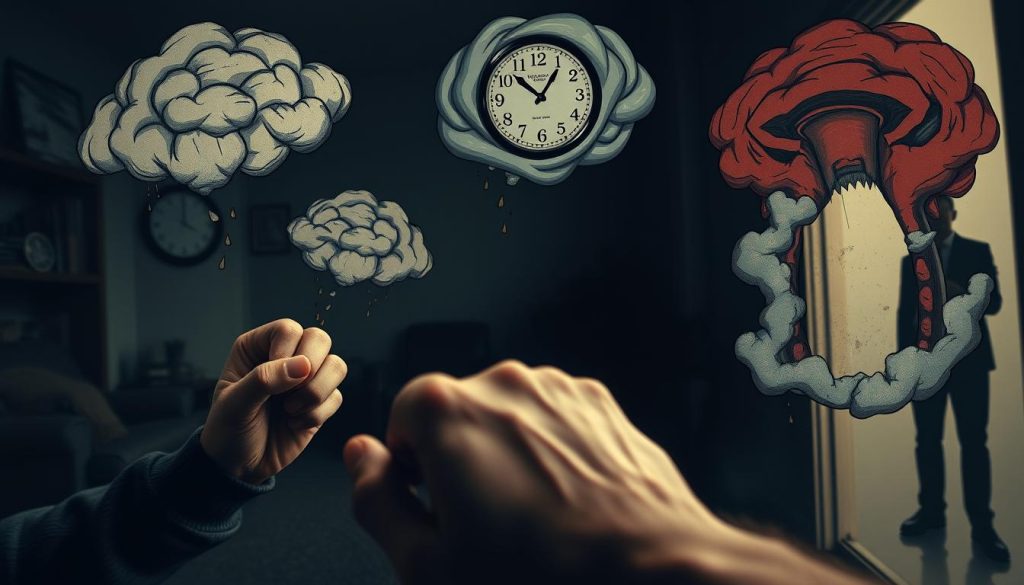Anxiety is a common mental health issue that affects many people. In this guide, we’ll look at what anxiety is, its symptoms, and how to manage it. You’ll learn how to live a calmer, more balanced life.
Anxiety can be complex, but it can be managed. We’ll cover its definition, types, and symptoms. You’ll learn to recognize and address anxiety.
We’ll also share strategies to control your anxiety. You’ll learn about cognitive-behavioral therapy, mindfulness, and relaxation. These tools will help you on your mental health journey. We’ll also talk about lifestyle changes and self-care for better well-being.
Getting professional help is key in fighting anxiety. We’ll guide you on when and how to seek support. This will empower you to overcome anxiety and take back your life.
What is Anxiety?
Anxiety is a natural feeling we all have sometimes. It’s how our body reacts to threats or stress. But for some, anxiety can be too much and turn into an anxiety disorder.
Defining Anxiety Disorder
Anxiety disorder is a mental health issue. It’s when you worry too much about normal things. This worry can really get in the way of your life and happiness.
Prevalence and Impact
More than 40 million adults in the U.S. have anxiety disorders each year. Anxiety can hurt your life, work, and health. It can make you less productive and cost a lot in healthcare.
Understanding anxiety and its potential to become a disorder is key. Recognizing symptoms and getting help can help manage anxiety. This way, you can live a better life.
Common Symptoms of Anxiety
Anxiety shows up in many ways, both physical and mental. Knowing how anxiety can appear is key to spotting and treating it.
The most common anxiety symptoms and signs of anxiety include:
- Persistent feelings of worry, nervousness, or apprehension
- Difficulty concentrating or focusing on tasks
- Irritability and restlessness
- Trouble falling or staying asleep
- Fatigue and lack of energy
Anxiety also has physical symptoms, like:
- Rapid heartbeat or palpitations
- Shortness of breath or shallow breathing
- Muscle tension and aches
- Sweating or feeling clammy
- Nausea or stomach discomfort
There are also psychological symptoms, such as:
- Excessive worrying or rumination
- Feelings of dread or impending doom
- Irrational fears or phobias
- Avoidance of situations that trigger anxiety
Spotting these anxiety symptoms is the first step to dealing with it. Understanding how anxiety can show up helps us manage it better.

| Physical Symptoms of Anxiety | Psychological Symptoms of Anxiety |
|---|---|
| Rapid heartbeat or palpitations | Excessive worrying or rumination |
| Shortness of breath or shallow breathing | Feelings of dread or impending doom |
| Muscle tension and aches | Irrational fears or phobias |
| Sweating or feeling clammy | Avoidance of situations that trigger anxiety |
| Nausea or stomach discomfort | Difficulty concentrating or focusing on tasks |
Physical Manifestations of Anxiety
Anxiety can really affect our body, causing many symptoms. These symptoms can change our daily life a lot. It’s important to know about these symptoms to help manage anxiety.
Heart Palpitations and Shortness of Breath
Heart palpitations are a big symptom of anxiety. It feels like your heart is racing or skipping beats. You might also feel like you can’t breathe well.
These feelings can be scary and make it hard to do everyday things. They can really upset you and affect your life.
Muscle Tension and Headaches
Anxiety can make your muscles tight and sore. This can lead to headaches. These headaches are often dull and aching.
These symptoms can make you feel even more uncomfortable. They can really lower your quality of life.
| Physical Symptom | Description | Connection to Anxiety |
|---|---|---|
| Heart Palpitations | Rapid or irregular heartbeats | Anxiety triggers the body’s stress response, leading to increased heart rate and palpitations. |
| Shortness of Breath | Feeling of difficulty breathing or catching one’s breath | Anxiety can cause hyperventilation and rapid, shallow breathing, leading to a sense of shortness of breath. |
| Muscle Tension | Stiffness, aches, and pain in the muscles | Anxiety triggers the body’s stress response, causing increased muscle tension and tightness. |
| Headaches | Tension-type headaches, often experienced as a dull, aching pain | Muscle tension associated with anxiety can lead to the development of tension-type headaches. |
Knowing about anxiety symptoms like heart issues, breathing problems, muscle tightness, and headaches helps us understand its impact. Recognizing these symptoms is the first step to getting help and managing anxiety. This can improve our life a lot.
Psychological Signs of Anxiety
Anxiety affects us not just physically but also mentally and emotionally. We’ll look at how too much worry and thinking the same thoughts can change our lives.
Excessive Worry and Rumination
Worrying too much is a big sign of anxiety. People with anxiety often worry about the future or small problems. This constant worrying can be very tiring and makes it hard to stay in the present.
Rumination is another sign of anxiety. It’s when you keep thinking about the same things over and over. Anxiety can make you stuck on past mistakes or future fears. This makes it hard to move on and find peace. It can also make you feel more stressed and less able to make decisions.
| Psychological Symptom | Description |
|---|---|
| Excessive Worry | Constant, uncontrollable concerns about the future, potential problems, or minor issues |
| Rumination | Repetitive thought patterns focused on past experiences, perceived failures, or worries about the future |
Knowing about the mental signs of anxiety helps us see its impact. This knowledge is the first step to finding ways to deal with anxiety. It can help us live better lives.

Types of Anxiety Disorders
Anxiety disorders have many forms, each with its own signs and symptoms. We’ll look at Generalized Anxiety Disorder (GAD), Panic Disorder, and Social Anxiety Disorder. This will help us understand the many ways anxiety can affect us.
Generalized Anxiety Disorder (GAD)
Generalized Anxiety Disorder (GAD) makes people worry too much about things like work, health, or family. They often feel scared all the time and can’t stop worrying. This can really hurt their daily life and happiness.
Panic Disorder
Panic Disorder causes sudden and scary panic attacks. These attacks make people feel very afraid and can make their heart race or make it hard to breathe. People with this disorder often fear having another attack and might avoid certain places or activities.
Social Anxiety Disorder
Social Anxiety Disorder, or social phobia, is a fear of being in social situations. People with this disorder feel very uncomfortable or scared when they’re around others or in the spotlight. They worry a lot about being judged, embarrassed, or humiliated.
Knowing about the different anxiety disorders is the first step to getting help. Each one has its own symptoms and needs its own treatment plan. By understanding our specific challenges, we can work towards better mental health and happiness.
Anxiety: Causes and Risk Factors
It’s important to know what causes anxiety. This helps us find ways to cope and get the right treatment. Anxiety comes from a mix of genes, environment, and lifestyle. Each part plays a role in how anxiety develops and stays.
Genetic Predisposition
Some people might be more likely to have anxiety because of their genes. If a family member has anxiety, you might be more at risk too. But we still don’t know exactly which genes are involved.
Environmental Factors
Bad experiences, like abuse or neglect, can lead to anxiety. These events can change how we see the world and handle stress. This makes us more likely to feel anxious.
Lifestyle and Habits
How we live can also affect our anxiety levels. Being inactive, not sleeping well, or drinking too much caffeine or alcohol can raise our risk. But, living healthily, exercising, sleeping enough, and eating well can help.
| Causes of Anxiety | Anxiety Risk Factors |
|---|---|
| Genetic Predisposition | Family History of Anxiety Disorders |
| Traumatic Life Experiences | Exposure to Stressful Events |
| Unhealthy Lifestyle Habits | Sedentary Lifestyle, Poor Sleep, Excessive Caffeine or Alcohol |
Knowing what causes anxiety helps us tackle it better. Getting help and using proven strategies are key. They help us deal with anxiety and improve our well-being over time.

Managing Anxiety: Coping Strategies
Dealing with anxiety can feel overwhelming. But, there are ways to take back control and feel better. We’ll look at Cognitive-Behavioral Therapy (CBT), mindfulness, and relaxation. We’ll also talk about how lifestyle changes and self-care can help reduce anxiety.
Cognitive-Behavioral Therapy (CBT)
Cognitive-Behavioral Therapy (CBT) is a proven method for managing anxiety. It helps us change our negative thoughts into more positive ones. This way, we can handle our anxiety better and live a fuller life.
Mindfulness and Relaxation Techniques
Mindfulness and relaxation are great for fighting anxiety. Deep breathing, meditation, and muscle relaxation help us stay present and calm. Adding these to our daily routine can make a big difference in managing anxiety.
Lifestyle Changes and Self-Care
Changing our lifestyle and focusing on self-care are key to managing anxiety. Regular exercise, healthy eating, and good sleep help a lot. So do hobbies and spending time with friends. These steps help us build a stronger, more balanced life.
By using these strategies, we can start to manage our anxiety better. Remember, it’s a journey. With the right tools and support, we can face anxiety with more confidence and strength.
Seeking Professional Help for Anxiety
Self-care and coping strategies are great, but sometimes you need professional help. Knowing when to ask for help is key to managing anxiety. Therapy and medication can give you the tools to beat anxiety and take back control of your mind.
If your anxiety is always there, messing with your daily life, or really stressing you out, it’s time to talk to a mental health expert. Therapists, counselors, and psychologists can help you make a plan to tackle your anxiety. They’ll teach you how to manage it better.
Getting help for anxiety might feel scary, but it’s a big step towards feeling better. By doing this, you’re taking charge of your life and health. Remember, you’re not alone. There are people and resources ready to help you on your way to better mental health.

